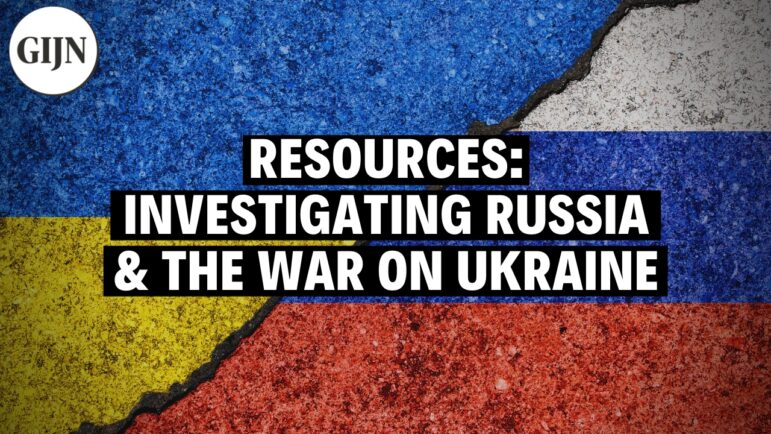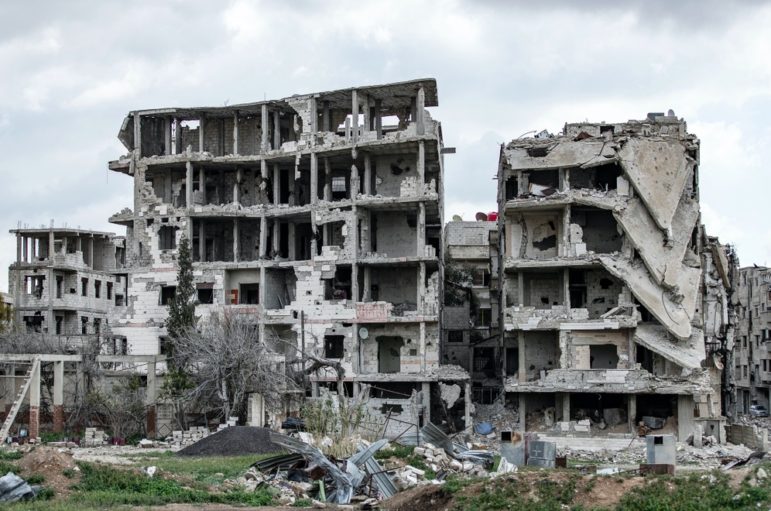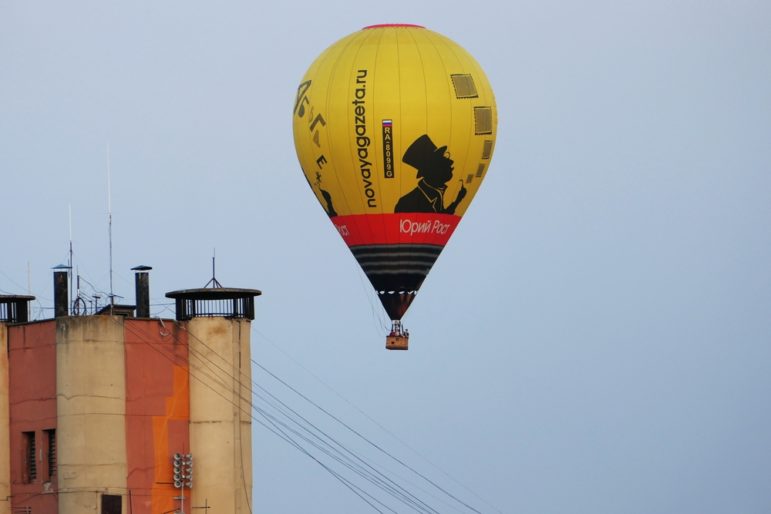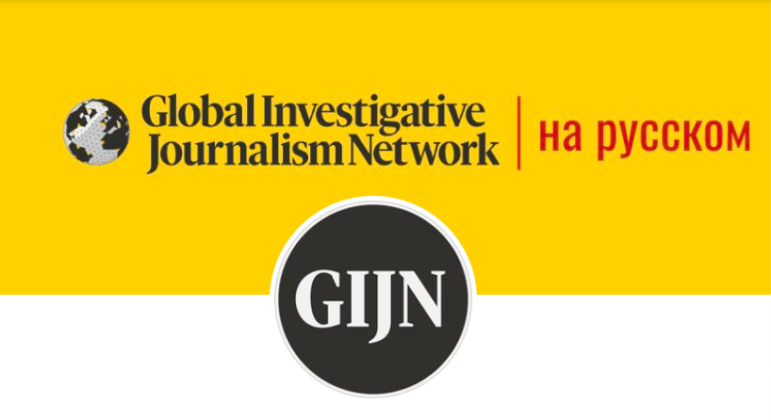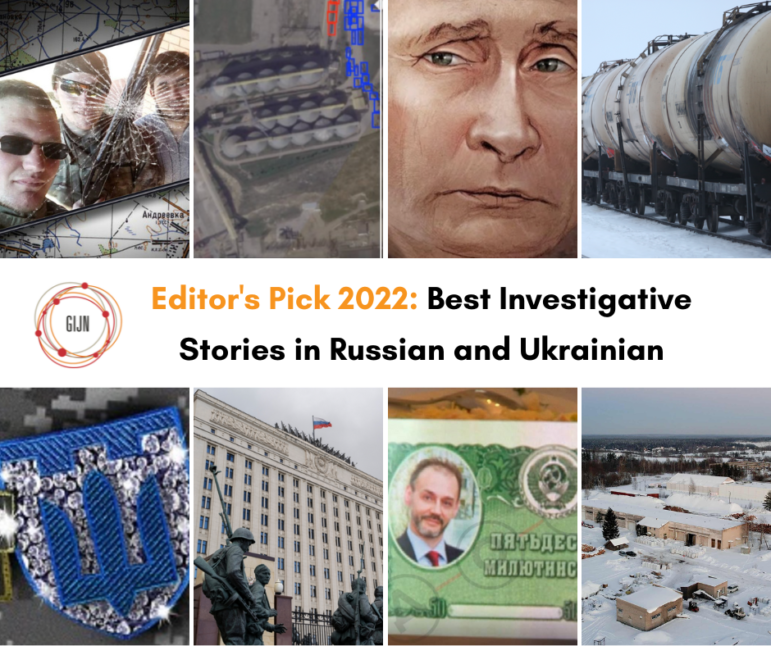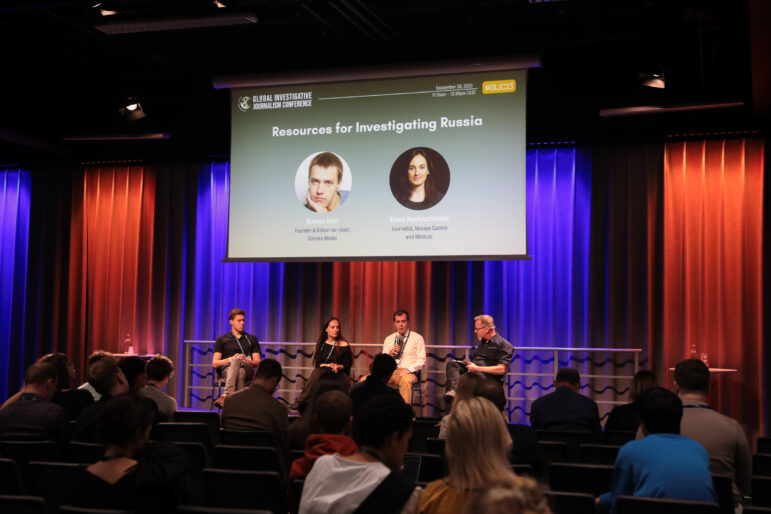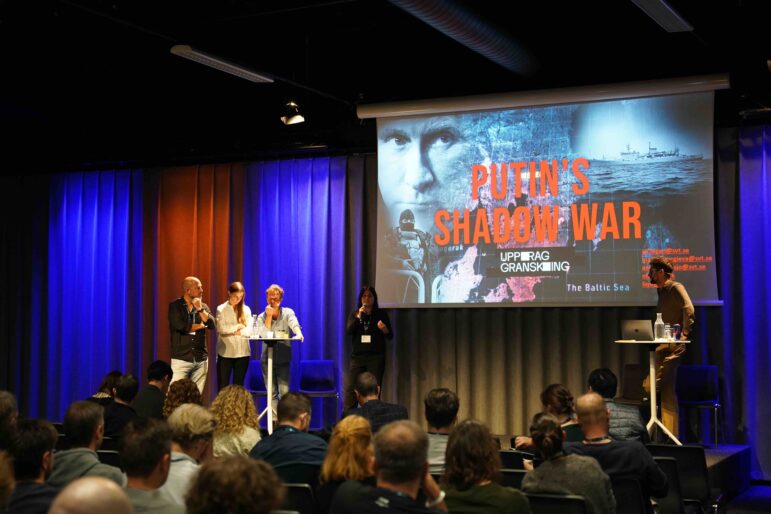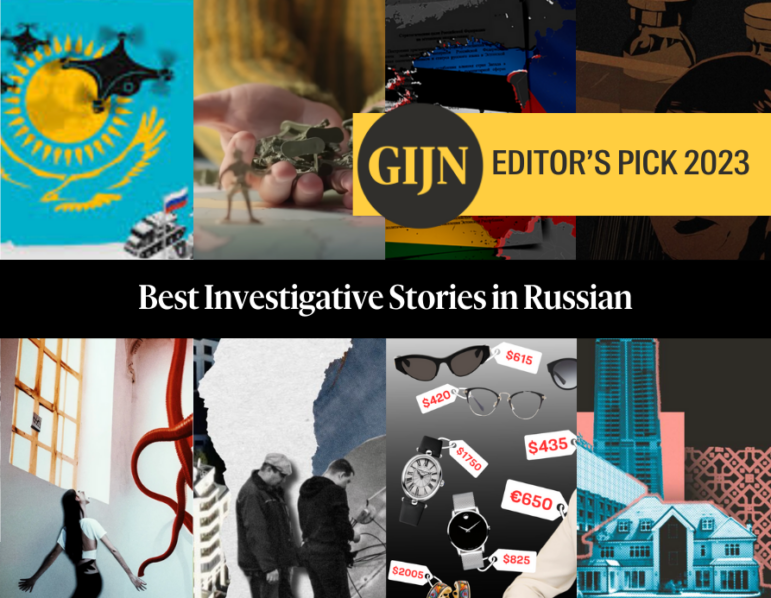

Image: GIJN
Rooftop Spooks, Internet Censorship, Governor Fashion Budgets: 2023’s Best Investigative Stories in Russian
Read this article in
This year was immensely challenging for the media and journalists in the region. In Russia, the designation of the remaining independent media outlets as foreign agents and undesirable organizations — forcing them to close or into exile — and the law on criminal punishment for discrediting Russia’s “special military operation” meant that by the beginning of 2023, practically no investigative media remained active within the country. Newsroom staff were forced to flee, conduct their work abroad, and report on Russia from the outside. The remaining investigative journalists were forced to work secretly, under pseudonyms, and potentially expose themselves and their sources to danger every day.
The attacks against investigative journalists and independent media also continue in Central Asia and the Caucasus. Kyrgyz authorities blocked the website of the independent media outlet Kloop, a GIJN member; attempted to block Radio Azattyk, RFE/RL’s local service. The Kyrgyz parliament also supported a law banning so-called foreign agents similar to the Russian version, putting pressure on independent media and human rights organizations. In Azerbaijan, journalists and other members of the investigative outlet AbzasMedia — and their sources — were detained on apparently falsified charges.
Despite the difficulties, our brave colleagues in Russia and elsewhere in the region have not given up. They continue to impress with innovative investigative tools combined with skillful use of traditional reporting methods. Below is a list of investigations that GIJN editors and readers recognized for their quality in 2023.
Censoring the Russian Internet
The hacking collective CyberPartisans provided to a team of Russian and international journalists internal documents and correspondence from the Main Radio Frequency Center (MRFC) — a subsidiary of Roskomnadzor, Russia’s federal agency for monitoring, censoring, and controlling Russian media.
By analyzing and cataloging the more than two terabytes (2,000 gigabytes) of leaked data, journalists from IStories, Mediazona, RFE/RL’s Russian investigative unit, Agentstvo, Dossier Center, and the Süddeutsche Zeitung shed light on the full picture of the censorship in the ‘RuNet’ — the Russian language community and internet sites. The team was able to assess the role MRFC plays in monitoring the Russian internet. In particular, the agency systematically gathers information on Russian citizens to develop lists of “foreign agents” — a designation Russia uses to crack down on dissent and civil society — and people to prosecute for sharing factual information or searching for any “fake news” related to the Russian state and its conduct of military operations in Ukraine, including merely referring to it as a war.
This series of articles also provided insight into Roskomnadzor’s broader activities, including the censorship of information related to the war, monitoring memes and other publications about Putin, the operation of its proprietary “bot farm,” monitoring protest moods in the regions, and the experimental testing of several new user surveillance systems on social media platforms.
The Shadow Investor
For more than a year, the OCCRP, RFE/RL’s Uzbek service, Kazakhstan’s Vlast, and Kyrgyzstan’s Kloop investigated the activities of a Uyghur businessman from China who became a significant investor in Central Asia after creating a vast empire by trucking illicit Chinese goods into the region.
With data from land cadastres (information about the boundaries and ownership of land parcels) and government documents, journalists developed a database of the businessman’s assets, including dozens of connected companies. According to the joint investigation, the businessman used funds of dubious origin to forge secret alliances with state authorities and pay off customs officials in Central Asian countries to strengthen his influence. The source of his fortune was exposed in 2019 when a former employee confessed to money laundering funds on his behalf, but the same companies allegedly used to funnel laundered money have now become investors in high-profile real estate developments across Central Asia.
How Kazakhstan Helps Supply Russia’s War Machine
Sanctions are meant to stop Russia from supplying its military from abroad, but sensitive electronics and other items fuelling Russia’s war are still getting through, according to this investigative collaboration involving Vlast, IStories, OCCRP, and Der Spiegel. The team traced supply chains through Kazakhstan, where new companies registered by Russian citizens serve as intermediaries. Another key finding is that Kazakhstan’s exports of drones and electronics to Russia have stepped up enormously — fuelling Russia’s drone attacks throughout Ukraine.
To show these connections, the team dug into Kazakh trade and Russian customs data, uncovering a network of Russian-controlled companies registered in Kazakhstan. These company distributors, bypassing sanctions, are involved in supplying drones and microelectronics worth millions of dollars to Russia, selling necessary parts through China, Kazakhstan, Kyrgyzstan, Armenia, or another country “friendly” to Russia.
The Kremlin’s Plans for Baltic States
Moscow’s primary objectives in the Baltic States are to prevent the expansion of NATO influence and strengthen pro-Russian organizations in Latvia, Lithuania, and Estonia — according to leaked documents revealing Russia’s strategy in the Baltic countries.
Journalists drawn from a sprawling cohort of media across several countries worked on this investigation: the Dossier Center, the Baltic Centre for Investigative Journalism – Re:Baltica, online news portal Delfi Estonia, Lithuanian radio and television network LRT, Poland’s Frontstory.pl, Sweden’s Expressen, Central Europe-focused nonprofit VSquare, German public broadcasters NDR and WDR, and Yahoo News. The team verified the leaked information and determined that the plans described in the documents were being implemented, such as by funding pro-Russian NGOs, efforts to keep the Russian language in schools, and opposing the demolition of Soviet monuments. Earlier, an international team of journalists reported on similar plans for Belarus and Moldova.
A Governor’s Fashion Budget
Moldovan news website Nokta has a special focus on Gagauzia — an autonomous territorial unit of Moldova, in the country’s south near the border with Romania — that represents a Turkic-speaking, Orthodox community. Nokta’s coverage of the former governor of Gaugauzia, they write, sparked many reader questions about her clothing and how much items cost. So they set about cataloging and pricing the clothes, jewelry, and accessories — including more than 40 jackets and five Swiss watches priced at hundreds of thousands of euros — that she wore at public appearances throughout 2022. Their report identifies 25 high-end fashion items, the costs of which alone far exceed her annual salary. Nokta journalists contacted the governor’s Main Directorate of Affairs to ask how she could fund her wardrobe but has received no response.
Rooftop Spooks
Journalists at The Insider Russia and Moldova’s Jurnal TV turned their attention to the growing number of satellite dishes and transmitting devices on the roof of the Russian embassy in Chisinau, Moldova, and tried to identify the people who were regularly observed servicing them on the rooftop.
According to the joint investigation, this “rooftop activity” tends to intensify in the runup to presidential and parliamentary elections and before foreign delegations visit Moldova. The individuals appear to be officers from Russian foreign intelligence with connections to groups that hacked the emails of former German Chancellor Angela Merkel, French President Emmanuel Macron, and former US Secretary of State Hillary Clinton. The investigation noted that the timing of hacks and leaks from high-ranking officials and law enforcement agencies seemed to coincide with the stepped-up presence of Russian intelligence officers at these rooftop sites.
In the wake of this investigative report, Moldova expelled 45 Russian diplomats and embassy personnel suspected of engaging in espionage activities.
Building A Pharma Empire
Given that independent journalism is nearly impossible in Tajikistan, where the government has cracked down on press freedom and criminal cases brought against journalists are rampant, investigating the president’s family is a bold move. By reviewing state procurement records, RFE/RL’s Tajik Service revealed that the pharmaceutical company headed by a relative of the president has won US$5.5 million in government contracts to supply drugs to the Ministry of Health and many other state medical institutions. The reporters also spoke to multiple sources in the business world and the pharmaceutical industry. While the family member’s role as the sole owner of the company is not publicly acknowledged by state officials or the media, their connection to the president has been mentioned at industry gatherings and conferences, RFE/RL reported.
RFE/RL journalists contacted the health ministry, the president’s office, and the company for comment on the state support that the company has received, but none of them responded in time for publication.
Putin’s War
This year, journalists from Russian investigative outlet Proekt launched the “Based on Real Events” series in a genre relatively unusual in Russian media: historical investigations. “His War,” the second story in the series, is a documentary about Russian President Vladimir Putin and how exactly he began the war in Ukraine. Film creator and investigative journalist Andrei Zakharov examined email leaks, documents relating to medals awarded to armed forces for annexing Crimea, and wiretaps of conversations between Russian officials and separatists recorded by the Ukrainian security service, as well as memoirs and confessions of Russian Spring participants — a term for the Russian-backed, pro-Russian and anti-government unrest in 2014. Zakharov argues that contrary to Putin’s narrative, it was Putin’s policies and political maneuvering that provoked the 2014 Euromaidan protest movements in Ukraine; that Russia had prepared for the annexation of Crimea long before these events; and that the intervention of Russian paramilitaries became the main reason the war in eastern and southern Ukraine began in 2014.
 Olga Simanovych, a native of Ukraine, has more than 13 years of television experience as a journalist, screenwriter, and managing editor. Seven of those years were spent as a TV news reporter for the Vikna-Novyny program on STB. From 2011 to 2016, she was a media trainer with various nonprofit organizations and participated in SCOOP’s international investigations. A graduate of Taras Shevchenko National University, Ukraine, she is bilingual in Ukrainian and Russian, and fluent in English and Greek.
Olga Simanovych, a native of Ukraine, has more than 13 years of television experience as a journalist, screenwriter, and managing editor. Seven of those years were spent as a TV news reporter for the Vikna-Novyny program on STB. From 2011 to 2016, she was a media trainer with various nonprofit organizations and participated in SCOOP’s international investigations. A graduate of Taras Shevchenko National University, Ukraine, she is bilingual in Ukrainian and Russian, and fluent in English and Greek.
 Kamila Eshalieva is GIJN’s Russian associate editor and a freelance journalist from Kyrgyzstan. She graduated with a journalism degree from the American University of Central Asia and served as a copy editor of the student newspaper. Kamila’s work has appeared in Open Democracy, a global media organization. She has written on subjects such as sexual and domestic violence, COVID-19, environmental issues, Kyrgyz politics.
Kamila Eshalieva is GIJN’s Russian associate editor and a freelance journalist from Kyrgyzstan. She graduated with a journalism degree from the American University of Central Asia and served as a copy editor of the student newspaper. Kamila’s work has appeared in Open Democracy, a global media organization. She has written on subjects such as sexual and domestic violence, COVID-19, environmental issues, Kyrgyz politics.

